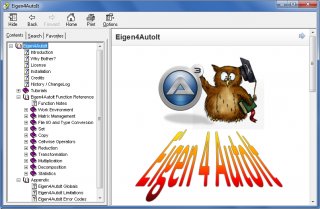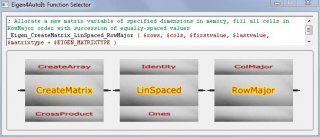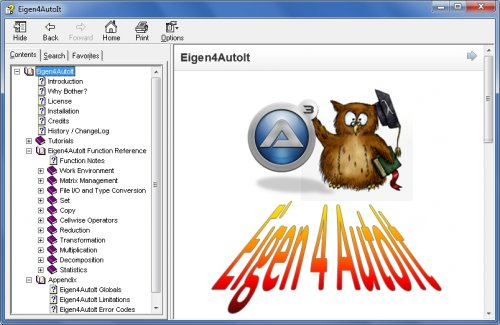Search the Community
Showing results for tags 'scientific computing'.
-
The Eigen C++ template library is a great environment for matrix computing; it is fast, reliable, extensive, and well-documented. It is also completely free, and does not rely on any external dependencies. Unfortunately for AutoIt users, the term “template library” implies that any functions you call are only instantiated upon compilation (in C++). That means there's nothing to hook into. To make Eigen ’s most important functionality directly accessible from within AutoIt scripts (version 3.3.14+, download it here), I developed the Eigen4AutoIt environment. It runs on Windows and under Wine also on Linux and Mac (Ubuntu, Debian, Fedora, and MacOS supported by WineHQ), and SUSE, Slackware, and FreeBSD supported by the distros). >Download the latest version It consists of: 1) Eigen4AutoIt.au3 an AutoIt library of wrapper functions that contain extensive bounds checks, matrix management, file I/O, type conversion, and precision control, and two-way data exchange with files and native AutoIt arrays; 2) Eigen-wrapper dlls (EigenDense.dll, EigenDense_x64.dll) re-maps matrices created in AutoIt as Eigen Matrix objects, then calls Eigen’s powerful core functions; in the spirit of open-source, the full C++ source code I wrote is included in the bundle (see subdirectory "source"). The basic functions consist of a single Eigen call; decompositions and statistics are more involved. 3) Additional materials: the user-interactive, animated Function Selector and MatrixViewer tools the MatrixFileConverter to read/write E4A matrices from/to .csv ASCII, Excel, and Xbase files. three libraries of scientific and mathematical constants online Help, with example code for every function Quickstart Manual (11-page pdf, updated) Test suite Tutorials from Basics to Advanced Please note: none of this is part of Eigen's own distribution you only need this bundle; you do not need to install Eigen. How it works: No matrix content is ever transferred, only memory pointers, meaning computations in AutoIt are virtually as fast as in Eigen’s native environment, with the added advantage of not having to be compiled first. The drawback is that Eigen's native ad-hoc expression templates (and their internal optimisations) cannot be exploited here; you have to construct your operations with the basic building blocks. These provide matrix creation, I/O, cellwise operations, reduction, multiplication, transformation, decomposition (LU, Householder, Choleski, and Jacobi SVD; these include general linear solvers) and a small statistics module by yours truly. IMPORTANT: Posting Rules for this thread: 1) Do not post or PM me any matrix-, maths-, or Eigen-related questions. Eigen has its own User Forum for that (or try math.stackExchange.com). I am not your maths guru! If you post such questions, I will either ignore your post or remind you of this rule. 2) Do not post or PM me your data sets and/or non-working Eigen4AutoIt scripts; I will not analyse your data or fix your scripts for you! There are many reasons why a linear algebra procedure might fail to produce the answer you expect. You are wielding great mathematical power here, so exploit the fantastic internet resources at your fingertips and learn how to use it. To get you started, I've listed a few video tutorials and other helpful materials in the header remarks of Eigen4AutoIt.au3. Also check out the test scripts, the Tutorials, and the Help file. 3) I do warmly welcome all of the following: remarks, advice, suggestions for improvements, encouragement, cash; bug reports re. the Eigen4AutoIt interface (individual functions that don't work the way they should) and/or the associated dll code (ditto); your own working Eigen4AutoIt templates of general use that you'd like to see implemented in a future release. Regarding that last item, have a look at my PCA tutorial. After the step-by-step stage, I summarise the entire procedure in a "mini script" of Eigen4AutoIt calls. Then I introduce the two internal PCA functions I developed, which replace that script with two simple calls. You can do the same thing, and submit your own functional Eigen4AutoIt script in this thread. If I consider it of general use and can implement it, it may become a new Eigen4AutoIt function in the next release (with source acknowledgement, of course). This means that you'd get a precompiled dll version of your script that will likely run faster and be simpler to call. Thereby this thread would become an Eigen4AutoIt Example Scripts mini forum. It's just a thought. >Download the latest version (uncompressed size: 36.1 MB) How to Install You need AutoIt version 3.3.14 or later. Simply run the installer, navigate to the tutorial subdirectory, open the first tutorial ("Basics") in Scite, and start it. This shows basic matrix I/O and mode switching (single versus double precision). If that runs, you're in business. NB to leverage the full power of x64 features, you'll also need to have the full Scite4AutoIt3 package installed. For more info, see sections "Bitness" and "Shared Memory" in the Help, main topic: "Work Environment" page.
- 93 replies
-
- matrix
- scientific computing
-
(and 1 more)
Tagged with:
-
Version 5.5
2,062 downloads
Eigen4AutoIt Features: free, fast matrix computing environment for Windows (runs under Wine on Linux and Mac) built upon the robust Eigen code base (open-source), with many enhancements simple, intuitive functions, with extensive online documentation supports integer, single, and double precision, in real and complex matrices Tutorials with scripts, plus Test scripts for each function section easily exchange data between native binary files (.mat) and ASCII, Excel, and Xbase files, or AutoIt arrays 32-bit (x86-mode) and 64-bit (x64-mode) support in x64-mode, matrices can be any size that fits into available virtual memory (>4GB), and can be shared between processes over one thousand alias wrappers for flexibility and ease-of-use The Eigen4AutoIt thread is here: This computing environment allows you to do matrix I/O (memory & files), matrix arithmetic, transformation, reduction, and decomposition, solve systems of linear equations, and perform statistics. Most functions can act on integer, real, or complex matrices (or the latter's real/imaginary parts separately). Much of the actual complexity of using Eigen in its native C++ environment has been hidden for AutoIt users, through extensive bounds and error checks, an intuitive function-naming convention, a large help file, and detailed tutorials and test examples.-
- scientific computing
- matrix
-
(and 3 more)
Tagged with:





